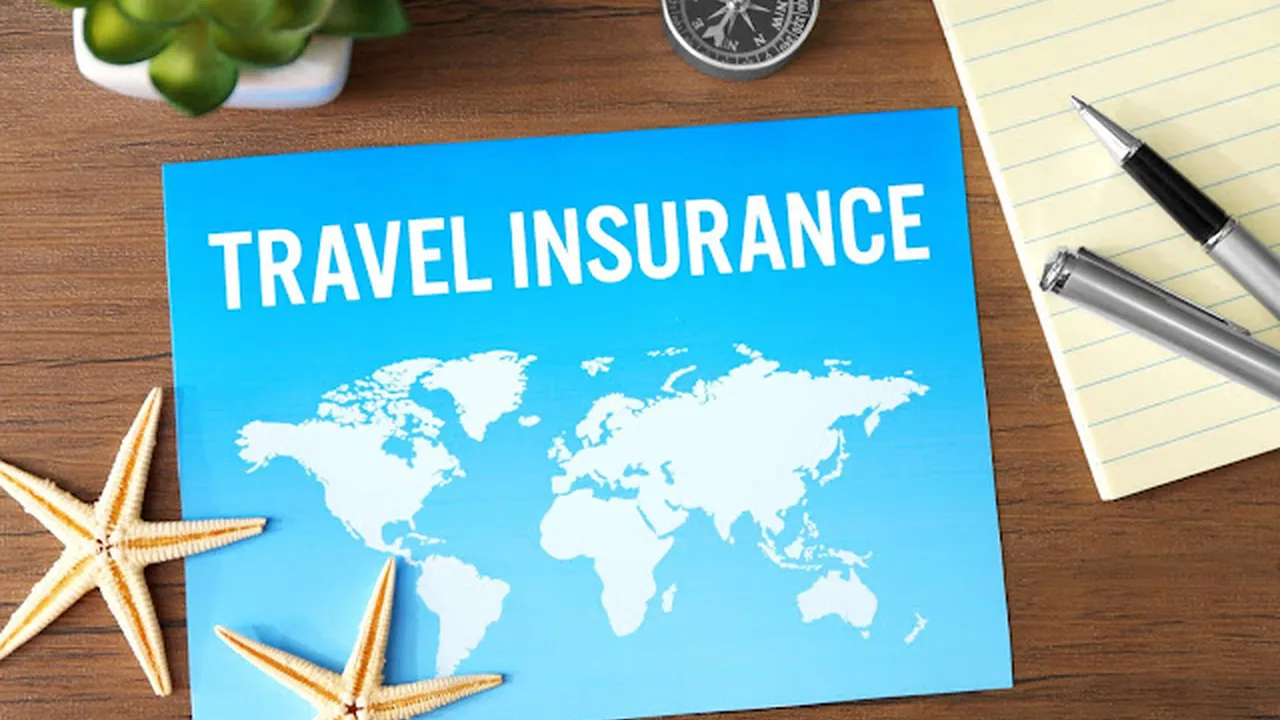Types of Travel Insurance: Which One is Right for You?

What is Travel Insurance and Why Do You Need It Travel Insurance Explained
So, you're planning a trip? Awesome! But before you pack your bags and dream of sandy beaches or snow-capped mountains, let's talk about something a little less exciting but equally important: travel insurance. Think of it as your safety net, your "just in case" plan, and your financial shield against the unexpected hiccups that can sometimes happen when you're far from home.
Travel insurance isn't just for worst-case scenarios. It covers a range of potential problems, from lost luggage to medical emergencies. Imagine this: you're hiking in the Alps, twist your ankle, and need a helicopter rescue. Without travel insurance, that could cost you a fortune. Or picture your suitcase taking an unexpected detour to Timbuktu, leaving you stranded without your clothes and essentials. Travel insurance can help you replace those items and get back on track.
Types of Travel Insurance Policies Finding the Right Coverage
Okay, so you're convinced you need travel insurance. Great! But now comes the tricky part: figuring out which type of policy is right for you. There's a whole alphabet soup of options out there, so let's break it down:
- Single Trip Insurance: This is your basic, no-frills coverage for a specific trip. It covers you from the moment you leave home until you return. Perfect for that annual vacation or weekend getaway.
- Multi-Trip Insurance (Annual Travel Insurance): If you're a frequent traveler, this is your best bet. It covers multiple trips within a year, saving you the hassle of buying a new policy each time. Just make sure to check the maximum trip duration allowed per trip.
- Medical Travel Insurance: This focuses primarily on medical expenses. It can cover doctor visits, hospital stays, emergency transportation, and even repatriation (getting you back home if you're seriously ill or injured).
- Cancellation Insurance: Life happens. If you need to cancel your trip due to illness, injury, or other unforeseen circumstances, this type of insurance can reimburse you for non-refundable expenses like flights and hotels.
- Baggage Insurance: Lost, stolen, or delayed luggage? Baggage insurance can help you replace your belongings and cover the cost of essential items while you wait for your suitcase to catch up.
- Adventure Travel Insurance: Planning a bungee jumping trip or a skiing adventure? This type of insurance covers activities that are considered higher risk and may not be included in standard policies.
Specific Travel Insurance Products and Their Best Use Cases
Now, let's dive into some specific travel insurance products and see when they might be the best fit for you. Keep in mind that prices can vary depending on your age, destination, trip duration, and the level of coverage you choose.
- World Nomads Explorer Plan: This is a popular choice for adventurous travelers. It covers a wide range of activities, including hiking, scuba diving, and skiing. It also offers good medical coverage and trip interruption benefits. Use Case: Backpacking through Southeast Asia. Price: Roughly $100-$200 for a two-week trip.
- Allianz Global Assistance AllTrips Premier: This annual plan is great for frequent travelers who want comprehensive coverage. It includes trip cancellation, interruption, baggage loss, and medical expenses. Use Case: Multiple business trips throughout the year. Price: Around $300-$500 per year.
- Travel Guard Essential: This is a budget-friendly option that still offers decent coverage. It includes trip cancellation, interruption, and medical expenses. Use Case: A short, domestic vacation. Price: Approximately $50-$100 for a one-week trip.
- MedjetAssist: This isn't technically travel insurance, but it's worth considering if you're concerned about medical evacuation. It provides medical transport to the hospital of your choice, rather than the nearest adequate facility. Use Case: Traveling to remote areas or if you have pre-existing medical conditions. Price: Varies based on membership level.
Comparing Travel Insurance Policies Finding the Best Value
Okay, you've got a few options in mind. Now it's time to compare them and find the best value for your money. Here are a few things to consider:
- Coverage Limits: How much will the policy pay out for medical expenses, trip cancellation, baggage loss, etc.? Make sure the limits are high enough to cover your potential losses.
- Deductibles: How much will you have to pay out of pocket before the insurance kicks in? A lower deductible means you'll pay less upfront, but your premiums will be higher.
- Exclusions: What isn't covered by the policy? Common exclusions include pre-existing medical conditions (unless specifically covered), acts of war, and participation in certain extreme sports.
- Customer Service: How easy is it to file a claim and get assistance? Read reviews and check the company's reputation for customer service.
- Price: Of course, price is a factor. But don't just go for the cheapest policy. Make sure it provides adequate coverage for your needs.
Use online comparison tools like Squaremouth or InsureMyTrip to compare policies side-by-side. These tools allow you to enter your trip details and get quotes from multiple providers.
Understanding Travel Insurance Costs Factors Affecting Premiums
So, how much will travel insurance set you back? The cost of travel insurance depends on several factors:
- Age: Older travelers typically pay more because they're statistically more likely to have medical issues.
- Destination: Traveling to countries with high medical costs or political instability will increase your premiums.
- Trip Duration: Longer trips require more coverage and will cost more.
- Coverage Level: Comprehensive policies with higher limits will be more expensive.
- Pre-existing Medical Conditions: If you have pre-existing conditions, you may need to pay extra for coverage or accept certain exclusions.
To save money on travel insurance, consider the following:
- Shop Around: Get quotes from multiple providers to compare prices.
- Increase Your Deductible: A higher deductible will lower your premiums.
- Buy Early: Buying your policy as soon as you book your trip can protect you against cancellation costs if something happens before you leave.
- Consider an Annual Plan: If you travel frequently, an annual plan can be more cost-effective than buying individual policies.
Making a Travel Insurance Claim What You Need to Know
Okay, so you've had to use your travel insurance. Here's what you need to know about making a claim:
- Gather Documentation: Collect all relevant documents, including your policy details, medical records, receipts, police reports (if applicable), and any other evidence to support your claim.
- Contact Your Insurance Provider: Notify your insurance provider as soon as possible after the incident. They will provide you with instructions on how to file a claim.
- Complete the Claim Form: Fill out the claim form accurately and completely. Provide as much detail as possible.
- Submit Your Claim: Submit your claim and all supporting documentation to your insurance provider.
- Follow Up: Keep track of your claim and follow up with your insurance provider if you haven't heard back within a reasonable timeframe.
Be honest and transparent when filing your claim. Providing false or misleading information can result in your claim being denied.
Common Travel Insurance Mistakes to Avoid
Let's make sure you don't fall into these common traps:
- Not Reading the Fine Print: Always read the policy details carefully to understand what's covered and what's not.
- Assuming Everything is Covered: Don't assume that your policy covers everything. Check the exclusions carefully.
- Underinsuring Yourself: Make sure you have adequate coverage limits for medical expenses, trip cancellation, and baggage loss.
- Waiting Until the Last Minute to Buy: Buying your policy at the last minute may not give you enough time to research your options and get the best coverage.
- Not Keeping Your Policy Information Handy: Make sure you have a copy of your policy details with you while you're traveling, both in paper form and electronically.
Travel Insurance and COVID-19 Navigating Pandemic Coverage
The COVID-19 pandemic has changed the travel landscape, and travel insurance is no exception. Many policies now offer coverage for COVID-19 related issues, but it's important to check the details carefully.
Look for policies that cover:
- Trip Cancellation due to COVID-19: If you test positive for COVID-19 before your trip and need to cancel, this coverage can reimburse you for non-refundable expenses.
- Medical Expenses related to COVID-19: If you contract COVID-19 while traveling, this coverage can pay for your medical expenses.
- Trip Interruption due to COVID-19: If you need to quarantine or return home early due to COVID-19, this coverage can reimburse you for additional expenses.
Be aware that some policies may exclude coverage for COVID-19 if you travel to a country with a high risk of infection or if you don't follow local health guidelines.
Travel Insurance for Specific Destinations Tailoring Your Coverage
Your destination can significantly impact the type of travel insurance you need. Consider these factors:
- Europe: If you're traveling to Europe, make sure your policy covers medical expenses, as healthcare can be expensive. Also, consider coverage for lost or stolen passports.
- United States: Healthcare in the US is notoriously expensive, so make sure you have high medical coverage limits.
- Southeast Asia: Consider coverage for adventure activities like scuba diving or hiking. Also, be aware of potential health risks like mosquito-borne illnesses.
- South America: Consider coverage for trip cancellation or interruption due to political instability or natural disasters.
Research your destination and identify any potential risks before you buy your policy.
Travel Insurance for Pre-Existing Conditions Getting the Right Protection
Having a pre-existing medical condition can make it more challenging to get travel insurance. However, it's not impossible. Here are a few options:
- Look for Policies that Cover Pre-Existing Conditions: Some policies specifically cover pre-existing conditions, but they may be more expensive.
- Consider a Waiver: Some policies offer a waiver for pre-existing conditions if you buy the policy within a certain timeframe after booking your trip.
- Disclose Your Conditions: Be honest and transparent about your pre-existing conditions when applying for travel insurance. Hiding information can result in your claim being denied.
Talk to your doctor about your travel plans and get their advice on what type of coverage you need.
:max_bytes(150000):strip_icc()/277019-baked-pork-chops-with-cream-of-mushroom-soup-DDMFS-beauty-4x3-BG-7505-5762b731cf30447d9cbbbbbf387beafa.jpg)






